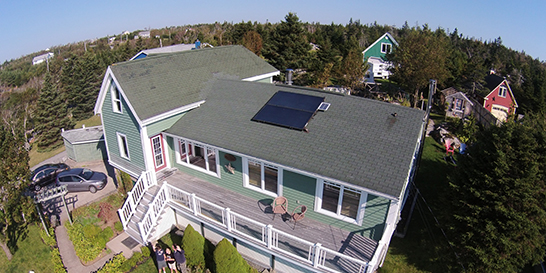|
This article is part of a series called Six sustainability ideas that have gone mainstream in Canada. Each article explores an innovative sustainability idea that may have seemed radical a decade ago but is now considered a best practice. The series features inspiring ideas and projects being implemented in Canadian cities and towns of all sizes, plus resources to help you implement these solutions in your community. |

The solar panel on the roof of this house in Halifax is part of a solar-powered water heating system, which reduces water consumption and lowers energy bills.
Reduce GHG emissions by constructing more energy-efficient homes
The UN estimates that buildings use about 40 per cent of global energy and are responsible for about 33 per cent of global greenhouse gas emissions. Consequently, cities need to dramatically improve the efficiency of new and existing buildings to achieve their ambitious climate change targets.
Net-zero energy (NZE) buildings are a key part of the puzzle. They are designed to produce as much energy as they consume on an annual basis. To qualify, the energy has to be produced onsite and come from renewable sources such as solar, wind and geothermal.
Net-zero energy construction, financing and education promoted across Canada
Both public and private sector actors are leading the way. For example, the Canadian Home Builders' Association (CHBA) Net Zero Energy Housing Council is developing pilot projects, financing, education and an NZE labelling program. Similarly, the Toronto Atmospheric Fund is using an Energy Savings Performance Agreement to retrofit buildings, generate revenue and reduce greenhouse gas emissions. Local governments — such as Halifax, NS, Bridgewater, NS, and Toronto, ON — are helping by financing energy retrofits through property taxes and local improvement charges.
Net-zero energy buildings offer better efficiency, comfort and air quality
The key to the success of net-zero energy construction is to combine efficiency, quality and accessibility. For example, the CHBA's net-zero energy homes are 80 per cent more energy efficient than homes built to code and offer other benefits such as improved comfort and indoor air quality. Their long-term goal is to deliver net-zero energy homes at "net-zero cost" by using the monthly energy savings to pay for the additional capital investments needed.
Interested in starting a net-zero energy project in your community?
Learn more with these resources:
- An Action Plan for Net Zero Energy Housing in Canada Moves Forward (Canadian Home Builders' Association)
Discover more sustainability ideas and project examples
Read the other articles in this series for more sustainability ideas and project examples that you can use in your community:
- Cranbrook gains $1.2M in value by using wastewater for irrigation
- How Saint-Hyacinthe turns organic waste into biogas and revenue
- Innovative projects prepare older Brampton suburbs for climate change
- How low-carbon design helps cut greenhouse gas emissions in half
- Ways Ottawa increases cycling with green transit options
This series was inspired by "From Crazy to Common Sense: 'Radical' Ideas Whose Time Have Come," a workshop that was held at the Federation of Canadian Municipalities' 2016 Sustainable Communities Conference.
Move ideas to reality: Get funding and free resources from FCM's Green Municipal Fund
Subscribe to email updates and get the resources, training, networking opportunities and funding you need from FCM's Green Municipal Fund to implement these sustainability ideas in your community.
Want to explore all GMF-funded projects? Check out the Projects Database for a complete overview of funded projects and get inspired by municipalities of all sizes, across Canada.

